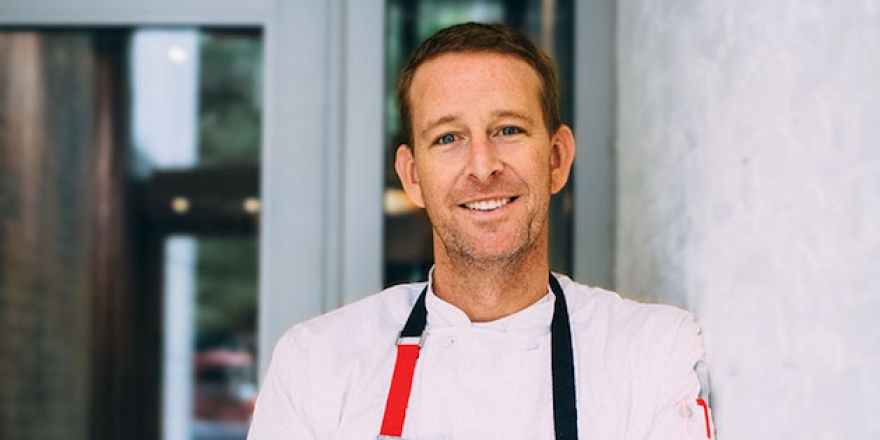Ace of Plates
An unexpected introduction to global flavors sets up a volleyball player with an international culinary career
“I made sure none of them were broken.”
That’s about as much effort that CJ Jacobson (’98) put into selecting a carton of eggs at the supermarket—and about as much as he knew about where those eggs came from. That was before he burst into the culinary world a little over 10 years ago—almost by chance—and became known for his penchant for local ingredients and insatiable appetite for foraging for things like sorrel and buckwheat from the mountains to the sea.
These days the chef/restaurateur, who is celebrated as one of the most memorable cast members on the hit Bravo competition show Top Chef, no longer peruses supermarket aisles. Instead, his passion lies in refining the flavors found in the Levant at Ēma, his latest restaurant venture in Chicago where he is chef/partner. The Mediterranean eatery demonstrates Jacobson’s mastery of revealing the beauty in the simplicity of ingredients. It also celebrates his indistinguishable California fare and the flavors he first discovered on his travels to the Middle East years ago.
A rising volleyball career after a successful college run took the six-foot-nine Jacobson around the world to the countries and communities that first exposed him to nuanced flavors and minimalist approaches to produce and dining. Locals guided him down the winding streets of Tel Aviv and through bustling bazaars bursting with scents and spices that he had never experienced growing up in Southern California.
“I remember everything I ate, and especially everyone’s approach to food,” remembers the Orange County native, who played on the US National Volleyball Team that took him to parts of Europe and the Middle East after competing as a middle blocker on the Waves men’s team. “It was the first time that I tried things like foie gras and cow udder. My relationship with food stood in stark contrast to the ones that I observed through my travels. People aren’t afraid of food so much in Europe and Israel.”
During a stay in Belgium, Jacobson’s meals were provided by his host family that lived on a sprawling property that was dotted by English-style gardens and home to roaming animals. The man of the house was a chef at a local restaurant and frequently welcomed local purveyors who made daily deliveries of meat, vegetables, liqueurs, and even eggs. Intrigued, Jacobson inquired about the friendships that the man nurtured with these vendors. The man’s response —“Why would I buy eggs from someone I don’t know?”— suddenly and dramatically shifted Jacobson’s view of food.
“It was eye-opening how healthy their lifestyles were,” he says. “I was fascinated by how different people saw food in different ways.”
Jacobson earned a Gold Medal at the US Olympic Festival in 1995, but after an unsuccessful Olympic trial, which also marked the end of his volleyball career, he opted to pursue culinary school in an effort to prolong his wonder and exploration of global food culture. After graduating from the Le Cordon Bleu-affiliated College of Culinary Arts in Pasadena, California, he worked for Wolfgang Puck and as a private chef throughout the Los Angeles area. Jacobson took his talent to local eateries Axe, the Yard, and Campanile and refined his skills under renowned chef René Redzepi at Noma in Copenhagen, Denmark, which for four years was ranked by Restaurant magazine as the Best Restaurant in the World. And thenTop Chef came calling.
“It gave me a lot more confidence,” he recalls of his stint on the third season of the Primetime Emmy Award-winning show in 2007. “I knew my place in the culinary world. I didn’t know a lot and I was lucky to be there. I needed to learn and grow.” Ultimately, he was booted for his execution of roasted broccolini, a dish that Anthony Bourdain famously likened to “something you would find in the back of Bob Marley’s closet.” He continued to make subsequent appearances in season 10 and on Top Chef Duels, the latter of which earned him an unexpected victory. And as he advanced in quick-fire challenges and impressed judges with his innovative dishes, he discovered the importance of giving and receiving constructive criticism.
“Kitchens are so cutthroat and tough—just one compliment will keep you going for a while. Now I’m intentional about giving my chefs feedback about their food,” he says. He applied this philosophy most recently as executive chef of Girasol restaurant in Studio City, California, his farmers’ market-driven, hyper-seasonal ode to California cuisine. With a new homebase at Ēma in Chicago, where a culture of fine dining outweighs a focus on locally sourced ingredients, the seasoned locavore is committed to bringing his signature sunshine to the Midwest.
“My whole methodology of ingredients had to change,” he explains. “I spent my entire career for the most part in L.A., and a large part of that was going to farmers’ markets and building relationships with the farmers. The selection would inspire me and dictate what I cooked.”
Now he is fueled by his dedication to sharing the flavors he’s known and loved with a different crowd—and will hopefully contribute to the dynamic shift taking place in the culinary world. As he continues to develop his repertoire and expand his eclectic endeavors, he predicts an evolution in diners’ palates and an eagerness to explore the faraway flavors he so appreciates.
“The restaurant industry has grown in the last decade,” he says. "I think Eastern Mediterranean and North African food will become part of the main conversation. As more and more people start getting into food, we will start to look at regions like Eastern Europe and the Baltic countries that haven’t yet found their voice in fine dining. It’s an exciting time.”
